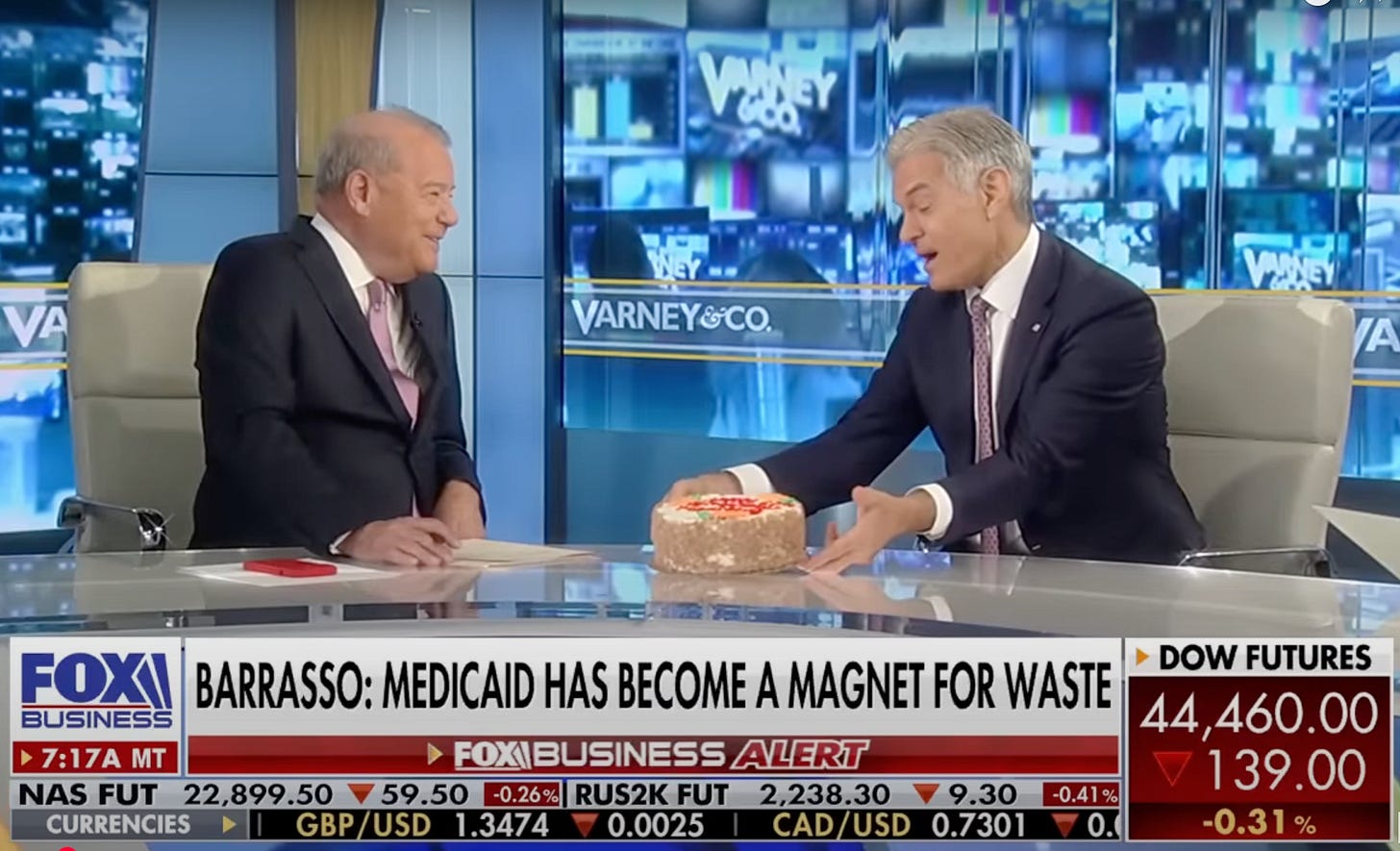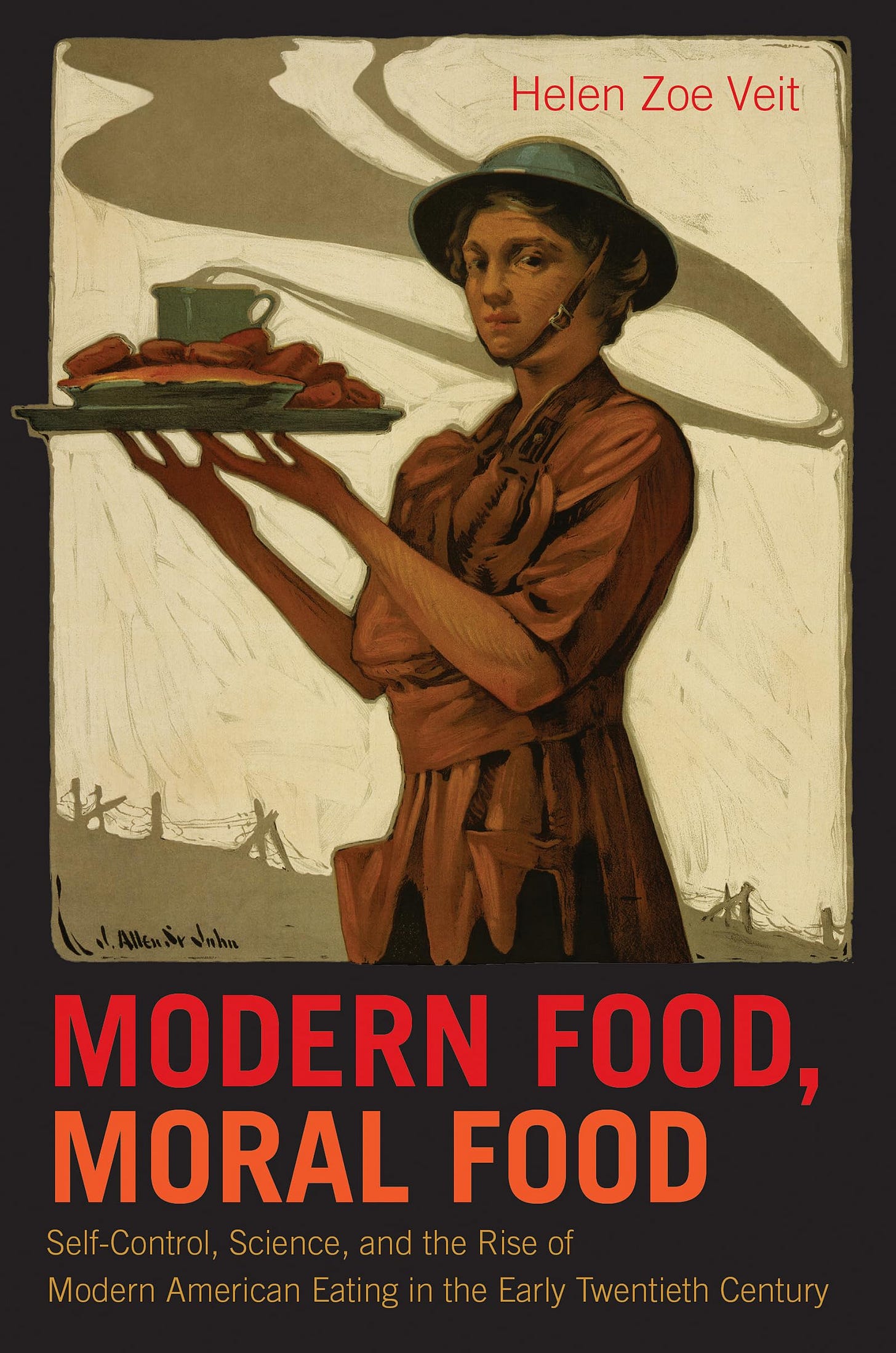Let Them Eat Less Cake!
Dr Oz and the Return of Health Patriotism, PLUS: how I'm coping with all the bad news
“It turns out that about the most patriotic thing you can do these days is to get healthy,” says Dr. Mehmet Oz, a millionaire famous for giving people sketchy health advice on daytime TV who now, in our timeline of absurdist horrors, runs the Centers for Medicare and Medicaid Services.1
Earlier this week, he made an appearance on FOX Business, where he brought the host a carrot cake to celebrate the 60th anniversary of Medicaid — a perfect symbol of how the Right is sugarcoating the cruelty of Trump’s reconciliation bill, which is projected to strip millions of poor and disabled people of their healthcare while pouring billions of dollars into a secret federal police force that is kidnapping our neighbors.
Here’s the gist of his insidious spin: Oz claims that he loves Medicaid, that Medicaid is precious, and that it must be protected from ‘fraud, waste, and abuse’ — all the ‘able-bodied people’ on Medicaid who he claims are spending ‘6.1 hours a day’ playing video games and watching TV.
In order to preserve our noble and righteous Medicaid, they had to create what he brands a ‘community engagement’ requirement — 80 hours of work, school, or volunteering per month to keep your healthcare. They’re not cutting Medicare at all (he lies) — actually, they’re going to spend $200 billion more dollars on it!
It’s unclear where he got this number, but it doesn’t match the Congressional Budget Office’s projections, which show a reduction in spending to the tune of $1 trillion. Maybe he’s doing that annoying thing where you argue from a technicality because you know that, in general, you’re wrong?
They’re not cutting by directly pulling funds from Medicaid, but rather by weaponizing paperwork — or, in bureaucracy-speak: ‘procedural disenrollment’.
Medicare recipients will have to prove their 80 hours of work per month twice a year to keep their healthcare. Administrative burdens like this have previously shown to produce high rates of disenrollment from Medicaid, either because people miss their deadlines, or because their cases close automatically while agencies lag behind under backlogs of paperwork.
Also: most people on Medicaid have jobs. Oz’s ‘able-bodied people’ playing video games for ‘6.1 hours per day’ comes from a post by the conservative think tank AEI, and he actually couldn’t even get the figure right. The study found 6.1 hours was the time spent on all socializing, where TV and video games accounted for 4.2 hours. But that’s not even the worst part!
Four public health experts responded to AEI’s analysis by saying it ‘contains a basic flaw that makes its findings and conclusions virtually useless.’
The dataset only included people who receive SSI — which automatically qualifies a person for Medicaid in most states — but also only represents ‘about 14% of low-income individuals with disabling conditions’. SSI is very hard to qualify for, and many disabled people who can’t work but do receive Medicaid are not on SSI.
Also, some people on SSI work, too. Also, it is possible to play 6 hours of video games a day while having a job!2 This stat is just bullshit spin with bad numbers that scapegoats poor and disabled people. The goofiest part of this interview, though, is when Oz fumbles over his little ‘MAHA Medicake’:
“We’ll be there for you, the American people, when you need help with Medicaid and Medicare, but you have to stay healthy as well, be vital, do the most you can do to really live up to the potential — your God-given potential — to live a full and healthy life. Don’t eat carrot cake.”
The host laughs in confusion. “[But] that’s what you’ve given me!”
Bringing Back Health Patriotism
Urging people to change their eating habits for God and Country is actually an old American tradition. In Modern Food, Moral Food, historian Helen Zoe Veit dug through 380,000 letters that Americans had sent to the US Food Administration in the late 1910’s to understand historical attitudes about food, and what she found tells us a lot about the rhetoric Oz is calling up once again.
The US Food Administration was a temporary agency created by Woodrow Wilson in order to export food to European allies whose enemies were trying to starve them out during the first World War. They needed to send stuff that kept well in a transatlantic trip and was nutrient-dense, so they focused on creating a surplus of ‘beef, pork, white flour, butter, and sugar’ by propagandizing the American public to forgo these foods and eat alternatives.
Veit writes:
“Administrators asked Americans to eat one meatless—meaning no red meat—and one wheatless meal each day, and to observe a completely meatless day on Tuesday, a porkless day on Saturday, and a wheatless day on Monday. Wartime pamphlets, posters, and cookbooks instructed Americans how to cook and eat what were to many people unfamiliar wartime substitutes like oatmeal, peanut butter, skim milk, cottage cheese, and pasta.”
Even though the government had the legal power to impose rations, they chose to encourage voluntary food conservation instead by tying it to morality and patriotic duty. This was seen as a kind of American exceptionalism — European nations had to enforce their rations, whereas Americans had the self-control to do it of their own accord.
Much of this food propaganda was directed at housewives, who were seen as serving a noble function in feeding the nation’s children. While wealthy white women wrote into the agency demanding ration cards that told them what to cook, poor and working class letter-writers mocked rationing as a privilege they couldn’t afford:
“The choice to live more ascetically was a luxury, and the notion of righteous food conservation struck those with nothing to save as a cruel joke.”
This rhetoric was also tied to the temperance movement, which spread the message that using wheat to make alcohol during wartime was a shameful waste. The idea that Americans had become soft, gluttonous, over-indulgers was everywhere during the Progressive era (as it still is now!), and making better food choices was seen as a way to be an honorable, patriotic citizen:
Hoover wrote a special message to Americans telling them to “go back” to a simpler way of living, one he implied that they had recently abandoned:
“Go back to the simple life, / Be contented with simple food, / Simple pleasures, simple clothes. / Work hard, pray hard, play hard.”
In a 21st century echo of this Progressive era propaganda, Oz told Dasha Burns of Politico that their ‘major goal’ is to get moms ‘energized’ to ‘get their kids healthy’. He has previously stated that he believes educating people about nutrition and walking 20 minutes a day are the best ways to achieve that patriotic healthiness.
But do these messages of personal responsibility really make people healthier? Cayce J. Hook and Hazel Rose Markus don’t think so. In a 2020 paper, they argued that they actually make people sicker by increasing their stress over controlling health problems that individuals cannot fully control. They write:
“Many everyday environments in the United States make healthy behaviors difficult, expensive, time-consuming, or counternormative, whereas unhealthy behaviors are often cheap, convenient, widely promoted, and normative..”
Take walking 20 minutes a day, for example. American towns have been designed to be car-centric, making their infrastructure hostile and dangerous for pedestrians.
And, just as choosing to eat fish and cheese instead of beef and flour was financially out of reach for many poor Americans during World War I, all the food nutrition in the world means nothing if you live in a food desert or a food swamp, or you have no money for groceries because Dr. Oz and co. cut food stamps, too.
Hook and Markus explain that a culture of personal responsibility limits the health policies that can be enacted to simply providing more information and more choices — two pillars of the MAHA movement. These policies ‘may help the rich get richer’, as ‘education campaigns tend to disproportionately benefit people with the greatest education and financial resources’.3
More choices are not necessarily good for you — they can actually increase anxiety, causing people to ‘agonize over decisions’ and to tie their choices to their identities, raising the stakes of every decision.
Telling the chronically ill to eat less cake for America is absurd, but health patriotism endures across the ages because it allows policymakers to project a facade of concern about real social problems, while shifting the responsibility for those problems onto you.
Responsibility is part of your personal health, but it’s far from the only thing that determines it. Your health is inseparable from everyone around you, and as Hook and Markus emphasize, it’s not just your own life that you have the agency to change, but the society that you live in, too.
For paid slugscribers this week:
Um, shit is bad! You probably don’t need me to count the ways — I’m sure you’re overwhelmed by all the shitty news on your feeds, too. So instead, here’s a few ways I am coping — personally, politically, and existentially — with this current, terrible moment.



